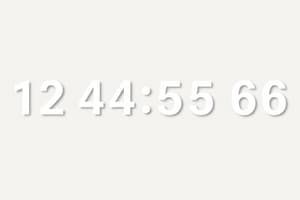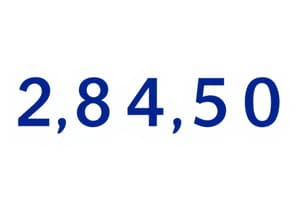Podcast
Questions and Answers
The sum of a rational number and an irrational number equals:
The sum of a rational number and an irrational number equals:
an irrational number.
Which fraction has a repeating decimal as its decimal expansion?
Which fraction has a repeating decimal as its decimal expansion?
3/11
What is the sum and classification of 3/20 + 10?
What is the sum and classification of 3/20 + 10?
3.31227766..., irrational
Which is the decimal expansion of 7/22?
Which is the decimal expansion of 7/22?
Which is the correct classification of 18?
Which is the correct classification of 18?
The repeating decimal 0.27 is converted to the fraction 0.27 = 3/x. What is the value of x in the fraction?
The repeating decimal 0.27 is converted to the fraction 0.27 = 3/x. What is the value of x in the fraction?
Which irrational number can be added to get a sum that is rational?
Which irrational number can be added to get a sum that is rational?
How many repeating digits are in 0.536?
How many repeating digits are in 0.536?
Flashcards
Rational + Irrational = Irrational
Rational + Irrational = Irrational
The sum of a rational number and an irrational number always results in an irrational number.
Repeating Decimal Fraction
Repeating Decimal Fraction
A fraction whose denominator, after simplifying, has a prime factor other than 2 or 5 will always have a repeating decimal expansion.
Sum of Rational and Integer
Sum of Rational and Integer
The sum of 3/20 and 10 is 3.31227766..., which is classified as an irrational number because the decimal expansion is non-repeating and non-terminating.
Decimal Expansion of 7/22
Decimal Expansion of 7/22
Signup and view all the flashcards
Irrational Number
Irrational Number
Signup and view all the flashcards
Repeating Decimal to Fraction
Repeating Decimal to Fraction
Signup and view all the flashcards
Irrational + Negative Irrational = Rational
Irrational + Negative Irrational = Rational
Signup and view all the flashcards
Repeating Digits
Repeating Digits
Signup and view all the flashcards
Study Notes
Rational and Irrational Numbers
- The sum of a rational number and an irrational number results in an irrational number.
- A fraction presenting a repeating decimal is 3/11.
Decimal Expansions
- The sum of fractions like 3/20 and whole numbers (10), results in an irrational number with a decimal approximation of 3.31227766...
- The decimal expansion of the fraction 7/22 is approximately 0.318, denoting it as a repeating decimal.
Classification of Numbers
- The whole number 18 is classified incorrectly in the context; it is a rational, non-repeating integer rather than an irrational number.
- The repeating decimal 0.27 can be expressed as the fraction 3/x, where x equals 11.
Manipulating Irrational Numbers
- To obtain a rational result from adding an irrational number, one can add its negative counterpart (e.g., -r).
Decimal Repetition
- The decimal 0.536 contains three repeating digits.
Studying That Suits You
Use AI to generate personalized quizzes and flashcards to suit your learning preferences.




